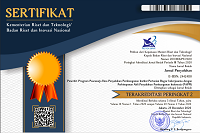Karakteristik Wanita Tuna Susila (WTS) dan Pengetahuan Tentang HIV/AIDS WTS di Panti Rehabilitasi Jawa Barat
Abstract
The characteristics of prostitutes were predicted to be related to their knowledge of HIV/AIDS. The reseach was designed as a descriptive survey involving 100 respondent/prostitutes from the Rehabilitation Center, selected through a Proportional Random Sampling. The collected data were put into a descriptive-qualitative analysis and the test Concordation Kendall W. The reseach has the following result: the average age of prostitutes is 26, they are maried, have the formal education of an elementary level, level of income 2.182.900 rupiahs, medium intrinsic motivation, low extrinsic motivation, have a perception of an ideal life for woman, working experience up to 1 year, never have violent sexual treatment, medium economic condition, low level of obedience to social norm, no social effect of origin, long distance to workplace, medium intensity of interaction with other prostitutes, moderate sexual teaching, high intensity of contact with costumers, and low perception of hedonism sex. In general the prostitutes know about HIV/AIDS. There is degree of similarity among them concerting the various characteristics of 10 ranking areas of HIV/AIDS knowledge, in which they are interested. As a conclusion, of the ten knowledge areas, there are three main areas of knowledge considered the most important: 1) the danger of HIV/AIDS, 2) method of transmission, and 3) preventing method.
Downloads
Authors who publish with this journal agree to the following terms:
- Authors retain copyright and grant the journal right of first publication with the work simultaneously licensed under a

This work is licensed under a Creative Commons Attribution 4.0 International License that allows others to share the work with an acknowledgement of the work's authorship and initial publication in this journal. - Authors are able to enter into separate, additional contractual arrangements for the non-exclusive distribution of the journal's published version of the work (e.g., post it to an institutional repository or publish it in a book), with an acknowledgement of its initial publication in this journal.
- Authors are permitted and encouraged to post their work online (e.g., in institutional repositories or on their website) prior to and during the submission process, as it can lead to productive exchanges, as well as earlier and greater citation of published work (See The Effect of Open Access).















